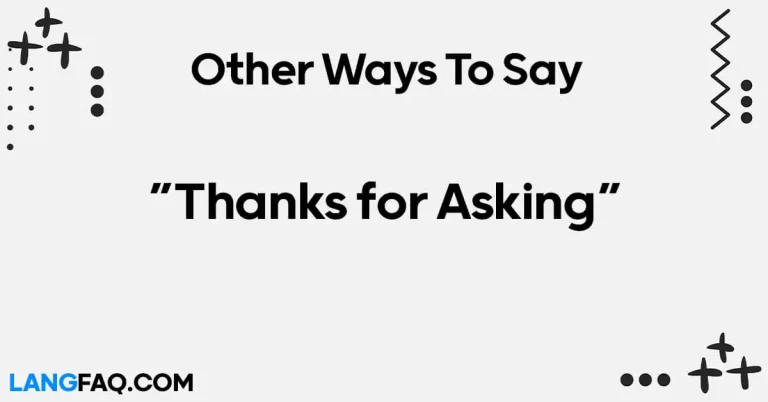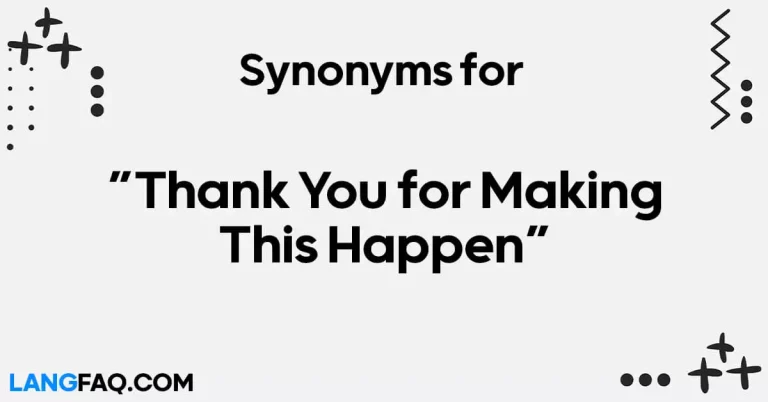In today’s dynamic work environment, expressing encouragement and recognizing commendable efforts goes a long way in fostering a positive atmosphere. While “Keep up the Good Work” is a timeless phrase, this article explores 12 alternative ways to convey appreciation and boost morale effectively.
12 Other Ways to Say “Keep up the Good Work”
Here are 12 other ways to say “Keep up the Good Work”:
- Well done!
- Fantastic job!
- Outstanding effort!
- Bravo!
- Impressive work!
- You’re doing great!
- Superb performance!
- Thumbs up!
- Kudos to you!
- Terrific job!
- Keep it up!
- Excellent work!
| Phrase | Meaning | Example |
|---|---|---|
| Well done! | Acknowledging a job done successfully | “Well done on completing the project ahead of time.” |
| Fantastic job! | Praising an exceptional and impressive effort | “You did a fantastic job presenting the proposal.” |
| Outstanding effort! | Recognizing exceptional dedication and hard work | “Your outstanding effort on this project is evident.” |
| Bravo! | Expressing admiration for a commendable achievement | “Bravo! Your presentation left a lasting impression.” |
| Impressive work! | Acknowledging work that leaves a strong impression | “Your attention to detail is truly impressive.” |
| You’re doing great! | Encouraging continued success and positive effort | “Keep it up, you’re doing great in your new role.” |
| Superb performance! | Praising a high-quality and exceptional performance | “Your superb performance in the play was remarkable.” |
| Thumbs up! | Signifying approval and admiration | “I give your innovative idea a big thumbs up.” |
| Kudos to you! | Offering praise and congratulations | “Kudos to you for leading the team to success.” |
| Terrific job! | Expressing delight and approval for a job well done | “You did a terrific job organizing the event.” |
| Keep it up! | Encouraging someone to continue their good work | “Great effort so far, keep it up!” |
| Excellent work! | Acknowledging work of high quality and excellence | “Your excellent work has significantly contributed.” |
In conclusion, these alternative phrases provide a diverse range of expressions to convey appreciation and encouragement. Whether acknowledging outstanding effort or praising superb performance, using a variety of phrases ensures sincerity and contributes to a positive and motivated environment.
Is It Correct to Say “Keep up the Good Work”?
Certainly! “Keep up the good work” is a widely accepted and positive phrase used to encourage someone to continue their current efforts. It is a commendation expressing approval for the quality of work someone has been doing and encourages them to maintain or even improve that standard. This phrase is suitable for various contexts, including the workplace, educational settings, or any situation where positive reinforcement is appropriate.
Examples:
- Workplace Context:
- Supervisor: “Your recent contributions to the team have been outstanding. Keep up the good work!”
- Email to a Colleague: “I wanted to commend you on your recent project. Keep up the good work; it truly makes a difference.”
- Educational Setting:
- Teacher to Student: “Your dedication to your studies is commendable. Keep up the good work, and you’ll surely excel!”
- Parent to Child: “I noticed the effort you’re putting into your homework. Keep up the good work, and your grades will reflect your dedication.”
Dictionary Insight:
According to the Cambridge Dictionary, the phrase “keep up the good work” is an idiom, and its definition aligns with the positive encouragement mentioned above. It’s used to praise someone for their efforts and to encourage them to continue in the same way.
Usage Tips:
- This phrase is versatile and can be used in both formal and informal settings.
- It’s best utilized when you want to acknowledge someone’s consistent good performance or efforts.
- The tone of the phrase is positive and motivational, making it suitable for various relationships, such as between colleagues, supervisors, teachers, or friends.
Exceptions:
While the phrase is generally positive, it’s essential to be mindful of the context and the individual’s personality. In some cases, people may find it repetitive or less impactful if used excessively. Therefore, it’s advisable to vary your expressions of encouragement to keep them sincere and effective.
Professional Mail Example With “Keep up the Good Work”
Subject: Recognition for Exceptional Performance
Dear [Recipient’s Name],
I trust this message finds you well. I wanted to take a moment to express my sincere appreciation for the exceptional work you’ve been doing on the recent project. Your dedication, attention to detail, and commitment to delivering high-quality results have not gone unnoticed.
The level of professionalism and expertise you consistently bring to your tasks significantly contributes to the success of our team. Your ability to handle complex challenges and meet tight deadlines is truly commendable.
I wanted to personally commend you for your outstanding performance. Keep up the good work! Your efforts are integral to the continued success of our projects, and I have no doubt that your commitment will lead to even greater achievements in the future.
If there are any resources or support you require to maintain this level of excellence, please don’t hesitate to let me know. Your contributions are highly valued, and I am grateful to have you as part of our team.
Once again, thank you for your hard work and dedication. Keep up the good work, and I look forward to witnessing more of your achievements in the future.
Best regards,
[Your Full Name] [Your Position] [Your Company] [Your Contact Information]
1. Well Done!
In the realm of workplace appreciation, “Well Done” is a classic phrase that never goes out of style. This expression is perfect for acknowledging a job done successfully, whether it’s completing a project, achieving a milestone, or delivering outstanding results. Its versatility makes it suitable for both formal and informal contexts.
Example Sentence: Formal Context: “Dear [Employee’s Name], I want to extend my heartfelt congratulations on the successful completion of the project. Well done! Your dedication and hard work truly paid off.”
Informal Context: “Hey [Friend’s Name], I heard you aced your presentation. Well done! Your effort shines through, and I’m proud of you.”
Email Sample:
Subject: Congratulations on a Job Well Done!
Dear [Employee’s Name],
I hope this email finds you well. I wanted to personally congratulate you on the successful completion of the project. Your hard work and dedication have not gone unnoticed. Well done! Your contributions have significantly contributed to the project’s success.
Best regards, [Your Name]
Variations:
- Splendid job!
- Bravo on the achievement!
- Congratulations on a stellar performance!
2. Fantastic Job!
When you want to go beyond the ordinary and express genuine excitement and admiration, “Fantastic Job” is the phrase to use. It adds an extra layer of enthusiasm to your praise, making the recipient feel truly valued.
Example Sentence: Formal Context: “Dear [Colleague’s Name], I must commend you on the fantastic job you did with the client presentation. Your thoroughness and creativity were truly impressive.”
Informal Context: “Wow, you cooked dinner and finished the report? Fantastic job! You’re a superhero.”
Email Sample:
Subject: Kudos on a Fantastic Job!
Dear [Colleague’s Name],
I wanted to take a moment to express my admiration for the fantastic job you did on the client presentation. Your attention to detail and innovative approach did not go unnoticed. Keep up the great work!
Best, [Your Name]
Variations:
- Phenomenal work!
- Outstanding effort, truly!
- You knocked it out of the park!
3. Outstanding Effort!
When recognizing exceptional dedication and hard work, “Outstanding Effort” becomes the go-to phrase. It conveys a deep appreciation for the effort invested and the remarkable results achieved.
Example Sentence: Formal Context: “Dear [Employee’s Name], your outstanding effort on the recent project has not only met but exceeded our expectations. Your commitment to excellence is truly commendable.”
Informal Context: “Working late to meet the deadline? Outstanding effort! Your dedication doesn’t go unnoticed.”
Email Sample:
Subject: Recognition for Outstanding Effort
Dear [Employee’s Name],
I wanted to formally recognize your outstanding effort on the recent project. Your commitment to excellence is truly commendable and has significantly contributed to the project’s success.
Sincerely, [Your Name]
Variations:
- Exceptional dedication!
- Your hard work is truly remarkable!
- I’m impressed by your extraordinary effort!
4. Bravo!
When you want to express admiration for a commendable achievement with flair, “Bravo” is the perfect phrase. It adds a touch of sophistication and celebration to your acknowledgment.
Example Sentence: Formal Context: “Bravo on the successful completion of the project. Your leadership and strategic thinking were key factors in its success.”
Informal Context: “Bravo on acing the presentation! You truly nailed it.”
Email Sample:
Subject: Bravo on Your Achievements!
Dear [Recipient’s Name],
I wanted to extend my congratulations and say bravo on the successful completion of the project. Your hard work and dedication are truly commendable.
Best regards, [Your Name]
Variations:
- Well done, bravo!
- A round of applause for your achievements!
- Bravo on a job well done!
5. Impressive Work!
When acknowledging work that leaves a strong and positive impression, “Impressive Work” is the phrase that captures the essence of admiration. It is suitable for recognizing achievements that go above and beyond expectations.
Example Sentence: Formal Context: “Your strategic analysis in the report is truly impressive work. It reflects your analytical skills and attention to detail.”
Informal Context: “Impressive work on the presentation! You really know how to make an impact.”
Email Sample:
Subject: Recognition for Impressive Work
Dear [Recipient’s Name],
I wanted to take a moment to recognize your impressive work on the recent project. Your dedication and attention to detail are truly commendable.
Best, [Your Name]
Variations:
- Exceptional work!
- Truly impressive efforts!
- Your work is outstanding!
6. You’re Doing Great!
For continuous encouragement and positive reinforcement, “You’re Doing Great” is a versatile phrase suitable for various situations. It provides motivation and support, acknowledging ongoing efforts.
Example Sentence: Formal Context: “I just wanted to let you know that you’re doing great in your new role. Your adaptability and dedication are impressive.”
Informal Context: “Feeling overwhelmed? Don’t worry; you’re doing great! Every step forward counts.”
Email Sample:
Subject: Encouragement – You’re Doing Great!
Dear [Recipient’s Name],
I wanted to send a quick note to remind you that you’re doing great in your new role. Your adaptability and dedication are truly impressive. Keep up the fantastic work!
Warm regards, [Your Name]
Variations:
- Keep up the good work!
- You’re doing an excellent job!
- Your efforts are truly appreciated!
7. Superb Performance!
When you want to emphasize a high-quality and exceptional performance, “Superb Performance” is the phrase to use. It conveys a level of excellence that goes beyond the ordinary.
Example Sentence: Formal Context: “Your leadership during the challenging project showcased superb performance. Your strategic decisions greatly contributed to its success.”
Informal Context: “Superb performance on the presentation! You really nailed every point.”
Email Sample:
Subject: Recognition for Superb Performance
Dear [Colleague’s Name],
I wanted to formally recognize your superb performance during the challenging project. Your leadership and strategic decisions significantly contributed to its success.
Best regards, [Your Name]
Variations:
- Exceptional performance!
- Outstanding job, superb!
- Kudos on your superb performance!
8. Thumbs Up!
Signifying approval and admiration, “Thumbs Up” is a casual yet effective way to acknowledge someone’s efforts. It’s suitable for various contexts and adds a touch of positivity.
Example Sentence: Formal Context: “Your proposal received a unanimous thumbs up from the team. It’s well-thought-out and aligns perfectly with our goals.”
Informal Context: “Thumbs up on completing the project ahead of schedule! You’re killing it.”
Email Sample:
Subject: Thumbs Up for Your Outstanding Work!
Dear [Recipient’s Name],
I wanted to give you a big thumbs up for your outstanding work on the recent project. Your effort and dedication are truly appreciated.
Best, [Your Name]
Variations:
- Two thumbs up for your efforts!
- Your work deserves a thumbs up!
- Thumbs up for a job well done!
9. Kudos to You!
“Kudos to You” is a phrase that offers praise and congratulations in a sophisticated manner. It acknowledges achievements and contributions with a touch of class.
Example Sentence: Formal Context: “Kudos to you for your exceptional leadership during the challenging quarter. Your strategic decisions significantly impacted our success.”
Informal Context: “Kudos on the successful presentation! You really aced it.”
Email Sample:
Subject: Kudos on Your Achievements!
Dear [Recipient’s Name],
I wanted to extend my congratulations and offer kudos to you for your exceptional contributions. Your dedication and hard work have not gone unnoticed.
Sincerely, [Your Name]
Variations:
- A big kudos to you!
- Congratulations, kudos!
- Kudos on a job well done!
10. Terrific Job!
When you want to express delight and approval for a job well done, “Terrific Job” is the phrase that encapsulates positive feedback. It’s suitable for acknowledging accomplishments and reinforcing a sense of achievement.
Example Sentence: Formal Context: “Your strategic planning for the event was outstanding. A terrific job that didn’t go unnoticed by the team.”
Informal Context: “Terrific job on the report! Your insights truly shine through.”
Email Sample:
Subject: Recognition for a Terrific Job!
Dear [Colleague’s Name],
I wanted to take a moment to express my appreciation for the terrific job you did on the recent project. Your dedication and attention to detail are truly commendable.
Best regards, [Your Name]
Variations:
- You did a terrific job!
- Terrific work on the presentation!
- A job well done, truly terrific!
11. Keep It Up!
For continuous encouragement and motivating someone to persist in their good work, “Keep It Up” is a versatile and positive phrase. It fosters a supportive environment.
Example Sentence: Formal Context: “Your efforts in mentoring the team are commendable. Keep it up, and you’ll see the positive impact on their performance.”
Informal Context: “Feeling tired? Keep it up! Your dedication is inspiring.”
Email Sample:
Subject: Encouragement – Keep It Up!
Dear [Recipient’s Name],
I wanted to send a quick note to encourage you to keep it up! Your dedication and efforts are truly inspiring, and they do not go unnoticed.
Warm regards, [Your Name]
Variations:
- Keep up the great work!
- Continue the excellent effort!
- Your persistence is admirable, keep it up!
12. Excellent Work!
Acknowledging work of high quality and excellence, “Excellent Work” is a timeless phrase that conveys a sense of accomplishment. It’s suitable for a wide range of situations and adds a touch of formality to your praise.
Example Sentence: Formal Context: “Your attention to detail in the project is commendable. Excellent work that significantly contributed to its success.”
Informal Context: “Excellent work on the presentation! Your preparation truly paid off.”
Email Sample:
Subject: Recognition for Excellent Work
Dear [Colleague’s Name],
I wanted to formally recognize your excellent work on the recent project. Your commitment to excellence is truly commendable and has not gone unnoticed.
Sincerely, [Your Name]
Variations:
- Your work is truly excellent!
- An excellent job well done!
- Commendable, truly excellent work!
FAQs
How do these phrases boost morale in the workplace? Expressing appreciation with diverse phrases shows sincerity and helps create a positive and motivating work environment, boosting morale effectively.
Can I use these phrases in written communication? Absolutely! These phrases work well in written communication, such as emails, notes, or messages, to convey appreciation professionally.
Is it essential to use alternative phrases regularly? While consistency is key, using these alternative phrases judiciously ensures they retain their impact and sincerity.
Do these phrases apply to any profession? Yes, these phrases are versatile and can be adapted to suit various professions, industries, and workplace scenarios.
How can I implement these phrases in team meetings? Incorporate these phrases during team meetings to publicly acknowledge and appreciate team members’ efforts, fostering a positive team spirit.
What’s the significance of recognizing exceptional work? Recognizing exceptional work not only motivates individuals but also cultivates a culture of excellence, driving overall team and organizational success.
Conclusion
In the realm of workplace interactions, expressing appreciation is an invaluable skill. By incorporating these alternative phrases, you not only diversify your expressions but also contribute to a positive, motivated, and thriving work environment.







